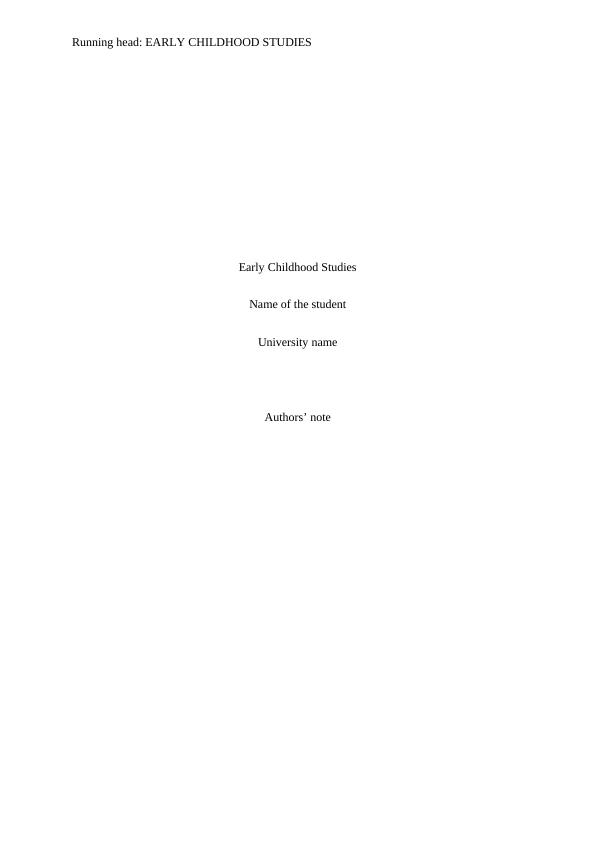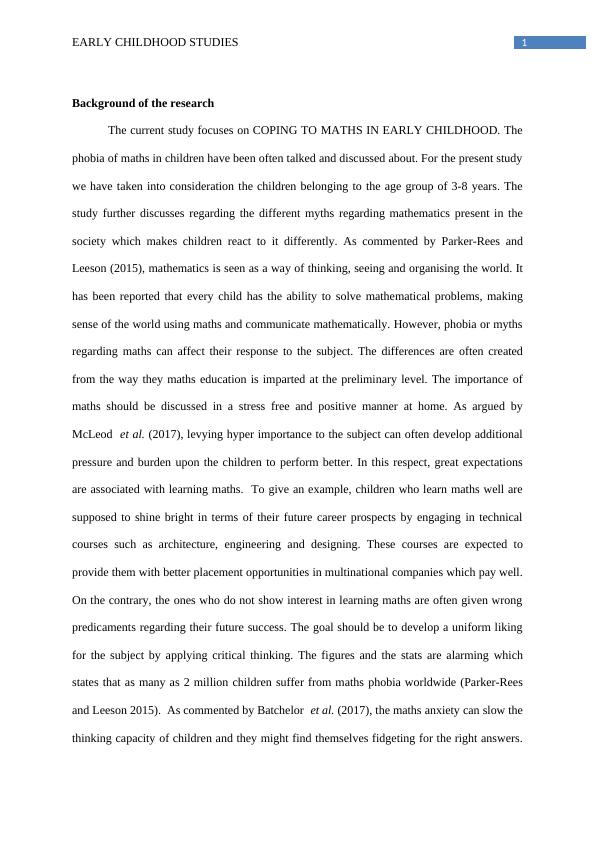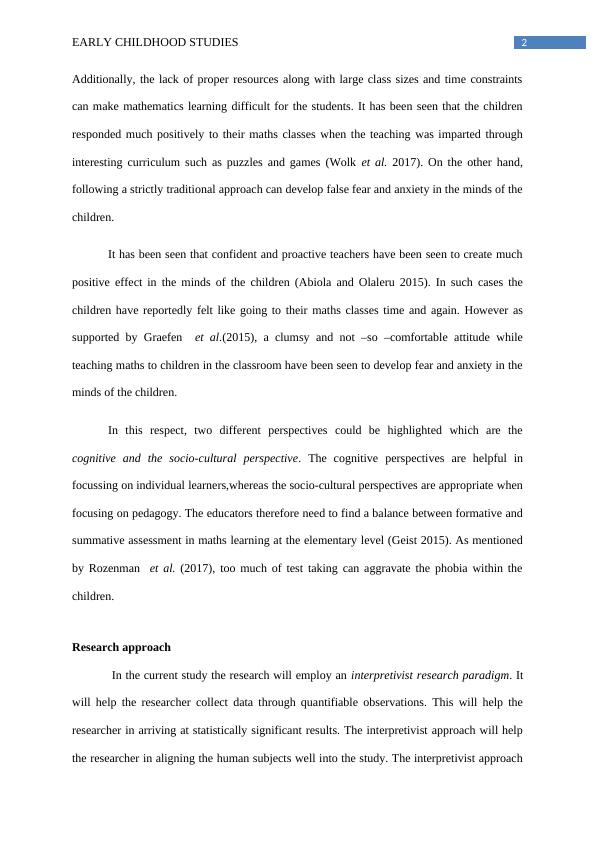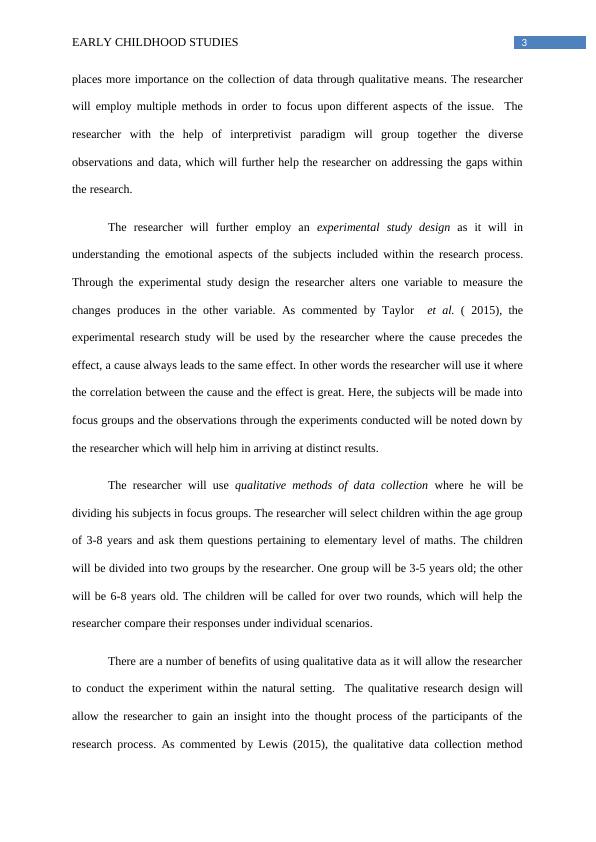Early Childhood Studies Assignment
Added on 2021-04-16
11 Pages2934 Words61 Views
Running head: EARLY CHILDHOOD STUDIESEarly Childhood StudiesName of the studentUniversity nameAuthors’ note

1EARLY CHILDHOOD STUDIESBackground of the research The current study focuses on COPING TO MATHS IN EARLY CHILDHOOD. Thephobia of maths in children have been often talked and discussed about. For the present studywe have taken into consideration the children belonging to the age group of 3-8 years. Thestudy further discusses regarding the different myths regarding mathematics present in thesociety which makes children react to it differently. As commented by Parker-Rees andLeeson (2015), mathematics is seen as a way of thinking, seeing and organising the world. Ithas been reported that every child has the ability to solve mathematical problems, makingsense of the world using maths and communicate mathematically. However, phobia or mythsregarding maths can affect their response to the subject. The differences are often createdfrom the way they maths education is imparted at the preliminary level. The importance ofmaths should be discussed in a stress free and positive manner at home. As argued byMcLeod et al. (2017), levying hyper importance to the subject can often develop additionalpressure and burden upon the children to perform better. In this respect, great expectationsare associated with learning maths. To give an example, children who learn maths well aresupposed to shine bright in terms of their future career prospects by engaging in technicalcourses such as architecture, engineering and designing. These courses are expected toprovide them with better placement opportunities in multinational companies which pay well.On the contrary, the ones who do not show interest in learning maths are often given wrongpredicaments regarding their future success. The goal should be to develop a uniform likingfor the subject by applying critical thinking. The figures and the stats are alarming whichstates that as many as 2 million children suffer from maths phobia worldwide (Parker-Reesand Leeson 2015). As commented by Batchelor et al. (2017), the maths anxiety can slow thethinking capacity of children and they might find themselves fidgeting for the right answers.

2EARLY CHILDHOOD STUDIESAdditionally, the lack of proper resources along with large class sizes and time constraintscan make mathematics learning difficult for the students. It has been seen that the childrenresponded much positively to their maths classes when the teaching was imparted throughinteresting curriculum such as puzzles and games (Wolk et al. 2017). On the other hand,following a strictly traditional approach can develop false fear and anxiety in the minds of thechildren.It has been seen that confident and proactive teachers have been seen to create muchpositive effect in the minds of the children (Abiola and Olaleru 2015). In such cases thechildren have reportedly felt like going to their maths classes time and again. However assupported by Graefen et al.(2015), a clumsy and not –so –comfortable attitude whileteaching maths to children in the classroom have been seen to develop fear and anxiety in theminds of the children.In this respect, two different perspectives could be highlighted which are thecognitive and the socio-cultural perspective. The cognitive perspectives are helpful infocussing on individual learners,whereas the socio-cultural perspectives are appropriate whenfocusing on pedagogy. The educators therefore need to find a balance between formative andsummative assessment in maths learning at the elementary level (Geist 2015). As mentionedby Rozenman et al. (2017), too much of test taking can aggravate the phobia within thechildren.Research approach In the current study the research will employ an interpretivist research paradigm. Itwill help the researcher collect data through quantifiable observations. This will help theresearcher in arriving at statistically significant results. The interpretivist approach will helpthe researcher in aligning the human subjects well into the study. The interpretivist approach

3EARLY CHILDHOOD STUDIESplaces more importance on the collection of data through qualitative means. The researcherwill employ multiple methods in order to focus upon different aspects of the issue. Theresearcher with the help of interpretivist paradigm will group together the diverseobservations and data, which will further help the researcher on addressing the gaps withinthe research.The researcher will further employ an experimental study design as it will inunderstanding the emotional aspects of the subjects included within the research process.Through the experimental study design the researcher alters one variable to measure thechanges produces in the other variable. As commented by Taylor et al. ( 2015), theexperimental research study will be used by the researcher where the cause precedes theeffect, a cause always leads to the same effect. In other words the researcher will use it wherethe correlation between the cause and the effect is great. Here, the subjects will be made intofocus groups and the observations through the experiments conducted will be noted down bythe researcher which will help him in arriving at distinct results.The researcher will use qualitative methods of data collection where he will bedividing his subjects in focus groups. The researcher will select children within the age groupof 3-8 years and ask them questions pertaining to elementary level of maths. The childrenwill be divided into two groups by the researcher. One group will be 3-5 years old; the otherwill be 6-8 years old. The children will be called for over two rounds, which will help theresearcher compare their responses under individual scenarios.There are a number of benefits of using qualitative data as it will allow the researcherto conduct the experiment within the natural setting. The qualitative research design willallow the researcher to gain an insight into the thought process of the participants of theresearch process. As commented by Lewis (2015), the qualitative data collection method

End of preview
Want to access all the pages? Upload your documents or become a member.
Related Documents
Mathematics Education, Phobia and Achievementlg...
|4
|558
|220
Ophidiophobia – Fear of Snakes Assignment PDFlg...
|6
|1162
|280
The World of Mathlg...
|9
|2569
|184
Child Development and Early Learning - Reportlg...
|11
|2831
|55
Role of Learning Theories in Childhood Educationlg...
|12
|1041
|343
Science And Technology Assignmentlg...
|6
|1138
|119